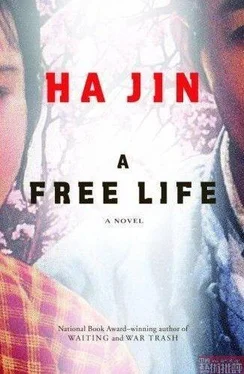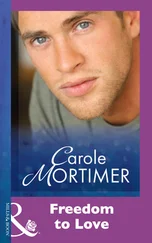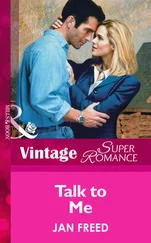IN MARCH, Mrs. Lodge bought eight ducklings, each already more than half a foot long, and kept them in the lake. They grew rapidly and in two months looked like adult ducks, waddling about with heavy asses. When swimming in the green water, they looked blaz-ingly white. Though they didn't fly away to other bodies of water, they took off occasionally, darting from one end of the lake to the other end and quacking gutturally. Because of their ability to fly, Nan often wondered whether they were a hybrid of some domestic and wild ducks. The eight of them always stayed together. When they paddled around, the largest drake would lead the flock, and together they resembled a miniature cruising fleet. Taotao called the head drake the bully, because the rascal would chase female ducks and even geese. If a goose was too large and too tall for it to tread, it would just sit on her back as she sailed around in the water, both of them shrieking like crazy.
One morning in May, Nan and Taotao returned from the supermarket with the Sunday Atlanta Journal-Constitution. The moment they got out of the car, the boy caught sight of the bully duck perching near the gate to the backyard and shuddering in silence. Taotao went up to it, but the drake wouldn't move or make any noise. He pushed it with his foot; still it wouldn't budge, trembling without pause. Nan came over too. They saw blood on its head and feathers. "He must have been injured," Nan thought aloud in English.
The boy ran into the house, flapping his hands above his waist like a pair of penguin flippers. He shouted, "Mom, we have the bully duck in our yard. He won't go away."
Mother and son came out together while Nan held up the drake and saw that it had been mangled by fishing lines and hooks, its tongue hanging out, slashed by a large fishhook that had gone through it from underneath. Several pieces of fishing line were twined around its neck, choking it. One of its wings had collapsed, unable to move. Stroking its feathers, Nan found another hook stuck in its good wing. He managed to dislodge this one and some other hooks, but he couldn't take off the one on its tongue, which, when he tried to remove it, hurt the duck more and made its mouth bleed again. The poor creature was so damaged that it couldn't make any noise.
Pingping cut the fishing lines with scissors, but they couldn't get rid of the fishhook without further injuring the drake's tongue. She went back into the house and returned with a pair of pliers, her apron pocket stuffed with a bottle and cotton balls. With both hands Nan severed the hook so that the barb wouldn't cut the tongue again when he pulled the shank out. The steel of the fishhook was so hard that it had even dented the edges of the pliers. "Open his mouth," Pingping said to Nan while taking an aspirin tablet out of her apron pocket.
Father and son pried the duck's bill apart. Pingping, who had worked on a poultry farm for two years back in China and knew how to treat sick chickens, broke the aspirin in half and inserted one piece into the drake's mouth. It swallowed the medicine, and she rubbed its throat to ensure that the aspirin sank into its craw. Next, with a pair of sticks she picked off the maggots from its wounds. Then she gingerly rubbed the gashes with a cotton ball soaked with hydrogen peroxide; the wounds kept foaming while the drake's legs twitched fitfully. After the treatment, Taotao and Nan carried the creature to the lakeside and released it. It paddled away listlessly, hardly able to keep its head above the water.
For the rest of the day, Nan and Pingping talked about the bully duck, which must have stayed in their yard for a whole night. The drake had been the strongest of the brood, but when it was injured, it had been left to die alone and none of the flock had accompanied it. All the other ducks perched in the shady bushes on the other shore, sleeping, feeding, and mating as usual. Once in a while they'd get into the water, frolicking or catching fish or insects. Their life wasn't in the least disrupted by their ex-leader's absence. Pingping sighed, "It's just like human beings-when you're weak, you're left to die alone."
To their amazement, two days later, the bully drake led the flock swimming in the lake again, its head raised high, and it quacked as lustily as before. Again it would chase female waterfowl. These ducks and the mallards were very fond of the Wus' backyard. They'd bask in the sun on the shore and lay eggs in the clumps of monkey grass. The lake couldn't sustain too many of them, so Pingping left only ten of the duck eggs in the grass to be hatched. She took the rest home and salted them in a jar of brine.
TAOTAO had been on a Scholars Bowl team, but his parents made him quit because he'd miss classes, having to travel frequently for the tournaments, and because when they stayed at a motel, two boys would share one bed, which Taotao disliked. Furthermore, he didn't learn much from the answers to the questions-to win, all you needed was a strong memory and quick response. Still, he was unhappy about leaving the team and often threw a fit at home, yelling at his father.
He wrote an essay about the injured drake for his English class and got an A for it. Mrs. Ashby, his teacher, put "Super!" on his homework, which pleased him and his parents. Nan also wrote about the incident, but he couldn't complete the poem, whose ending simply didn't work no matter how hard he tried. By chance Taotao saw a draft of the poem Nan had thrown away. Outraged, he told his father, "That's my story. You shouldn't steal from me."
His parents were stumped. Nan said, "W-what do you mean?"
"I wrote about the duck already. If you did the same, you committed plagiarism."
"What's that?" asked his mother.
"Stealing ozzers' ideas," Nan explained, then turned to his son. "It's our story. We all took part in rescuing zer duck. And I didn't use any of your ideas or sentences and my speaker is zer duck. How can you accuse me of plagiarism?"
"But I've already written about it. You can't use it again."
"Who says I can't?" Nan was losing his temper, his eyeballs throbbing.
"The law says."
"Give me a break! You're not a lawyer."
"Fuck you!" The boy dropped his cereal bowl on the dining table and stood up.
"Say that again!" Nan jumped to his feet and grabbed at his son. Then he stopped and withdrew his hand, just glaring at him.
Pingping intervened, "Taotao, you apologize to Daddy. You curse him first, you must apologize."
Ignoring her order, the boy hoisted his book bag over his shoulder and tore out the door for the bus stop. These days he was often annoyed by Nan, who would in secret search his drawers and book bag every two or three days to make sure he was drug-free, and who would read his e-mail messages whenever he forgot to shut off his account. How many times had he told him not to invade his privacy? But his father just wouldn't mend his ways, treating him as if he were a culprit on parole. What a stupid asshole.
As Taotao was striding away, his mother caught up with him. She grasped his upper arm and stopped him, saying, "You must apologize to Daddy."
"He started it. Ow! Don't break my humerus!" "I don't care who start. You curse him, you apologize." She was still clutching his arm. "No, I won't!"
"He's your father. In whole world, if you can find another man who is better to you than Daddy, you don't need apologize. If you cannot find such man, you must apologize to him."
Taotao looked at her with a knotted brow, then ambled back to the house. Yanking open the screen door, he shouted, "I'm sorry, Daddy, okay?"
"That's fine," said Nan.
Although the exchange with his son spoiled Nan 's desire to work on his poem about the injured duck, he was amazed that during the whole altercation none of them had spoken a single Chinese word. He went out to the deck and swept away the pollen and dust, pleased he had contained his temper this time.
Читать дальше












